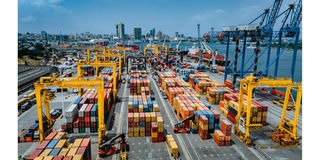Prime
DP World, CMST, Henry Bath ink deal to channel global metals trade through Dar port

What you need to know:
- The move is expected to significantly boost Tanzania’s position as a key regional hub for the warehousing and trade of strategic minerals, according to Tanzania Ports Authority (TPA) director general, Mr Plasduce Mbosa
Dar es Salaam. Global logistics firm, DP World, has signed an agreement with China Metal Storage and Transport Company (CMST) and Henry Bath & Sons Ltd of the UK to channel global metals trade through the Port of Dar es Salaam.
The move is expected to significantly boost Tanzania’s position as a key regional hub for the warehousing and trade of strategic minerals, according to Tanzania Ports Authority (TPA) director general, Mr Plasduce Mbosa.
“This partnership positions Dar es Salaam as a growing centre for metals storage and trade across Africa,” Mr Mbosa told The Citizen.
“We are already seeing major clients coming on board—starting with Metrology and now extending to CMST and Henry Bath.”
The agreement builds on DP World’s 30-year concession, signed in 2023, to operate and modernise the port. Mr Mbosa noted that the initiative goes beyond cargo handling.
“This is not just about cargo; it is about transforming Tanzania into a hub for storing, trading, and financing critical minerals such as copper and cobalt. As the global demand for green minerals rises, Dar es Salaam is no longer just a corridor—it is becoming a command post in the global energy transition,” he said.
Major infrastructure investments are currently underway.
These include the construction of berths 12 to 22, expansion projects at both the Dar es Salaam and Bagamoyo ports, and ongoing improvements to the Standard Gauge Railway (SGR) and the Tanzania-Zambia Railway (Tazara).
“These reforms have already borne fruit,” Mr Mbosa added. “Ship waiting times have reduced from 30 days to nearly zero, and cargo turnaround times now average under 48 hours.”
He attributed these achievements to strategic reforms implemented under President Samia Suluhu Hassan’s administration.
Key measures include engaging global port operators, launching the Dar es Salaam Maritime Gateway Project, and deploying the Tanzania Electronic Single Window and enhanced Customs Integrated Systems.
As a result, cargo from Zambia and the Democratic Republic of Congo (DRC) is now moving more efficiently through the port, helping to lower trade costs and speed up the delivery of key exports such as coffee and cotton, as well as essential imports including fuel and medical supplies.
“This transformation didn’t happen by chance,” Mr Mbosa said. “It is the result of deliberate, tough decisions that are positioning Tanzania as a logistics leader and shaping the future of African trade.”
He highlighted increasing interest from global stakeholders. CMST and Henry Bath—firms that collectively manage hundreds of billions of dollars’ worth of commodities annually—are now committing to Dar es Salaam, reinforcing confidence in the port’s credibility.
“Our infrastructure is no longer the bottleneck it once was,” he said. “We have upgraded road and rail links, improved security, and created a more investor-friendly climate. Trucks are now travelling from Tunduma and back without delays, and insurers are taking note.”
“Shipping companies are recognising the progress—rising cargo volumes, more efficient operations—it all feeds into increased national revenue and strengthens Tanzania’s role in regional trade. This is bigger than cranes and cargo. With sustained focus and partnership, Dar es Salaam’s quiet revolution may become Africa’s loudest trade success story.”
Commenting on the development, a senior lecturer at the Dar es Salaam University College of Education (DUCE), Dr Abel Kinyondo, said that while inefficiency had long hindered the port’s potential, the entry of DP World marked a turning point.
“In the past, inefficiencies limited the port’s ability to serve as a true regional trade hub. But operational improvements under DP World have laid the groundwork for Dar to become a key logistics gateway for Eastern and Central Africa,” he said.
Dr Kinyondo noted that landlocked countries such as Uganda, Rwanda, South Sudan and parts of the DRC rely heavily on efficient access to seaports for their imports and exports.
However, logistical challenges, weak infrastructure and bureaucratic delays have so far hampered Tanzania’s ability to fully seize this strategic opportunity.
He cited Singapore as a model, noting that despite its small size and lack of natural resources, it has developed one of the world’s most efficient ports by investing in cutting-edge infrastructure, streamlined customs processes, and technology-driven service delivery.
“If we can emulate that level of efficiency—ensuring goods move quickly and seamlessly through our ports—Tanzania can unlock vast economic potential. A well-managed, high-speed port can become a powerful engine for revenue generation, job creation, and regional influence,” he said.





